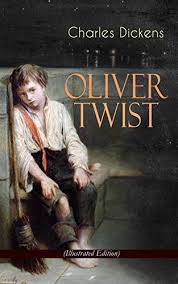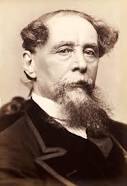Oliver Twist Page #18
Oliver Twist; or, the Parish Boy's Progress is Charles Dickens's second novel, and was published as a serial from 1837 to 1839 and released as a three-volume book in 1838, before the serialization ended. The story centres on orphan Oliver Twist, born in a workhouse and sold into apprenticeship with an undertaker.
Mr. Dawkin's appearance did not say a vast deal in favour of the comforts which his patron's interest obtained for those whom he took under his protection; but, as he had a rather flightly and dissolute mode of conversing, and furthermore avowed that among his intimate friends he was better known by the sobriquet of 'The Artful Dodger,' Oliver concluded that, being of a dissipated and careless turn, the moral precepts of his benefactor had hitherto been thrown away upon him. Under this impression, he secretly resolved to cultivate the good opinion of the old gentleman as quickly as possible; and, if he found the Dodger incorrigible, as he more than half suspected he should, to decline the honour of his farther acquaintance. As John Dawkins objected to their entering London before nightfall, it was nearly eleven o'clock when they reached the turnpike at Islington. They crossed from the Angel into St. John's Road; struck down the small street which terminates at Sadler's Wells Theatre; through Exmouth Street and Coppice Row; down the little court by the side of the workhouse; across the classic ground which once bore the name of Hockley-in-the-Hole; thence into Little Saffron Hill; and so into Saffron Hill the Great: along which the Dodger scudded at a rapid pace, directing Oliver to follow close at his heels. Although Oliver had enough to occupy his attention in keeping sight of his leader, he could not help bestowing a few hasty glances on either side of the way, as he passed along. A dirtier or more wretched place he had never seen. The street was very narrow and muddy, and the air was impregnated with filthy odours. There were a good many small shops; but the only stock in trade appeared to be heaps of children, who, even at that time of night, were crawling in and out at the doors, or screaming from the inside. The sole places that seemed to prosper amid the general blight of the place, were the public-houses; and in them, the lowest orders of Irish were wrangling with might and main. Covered ways and yards, which here and there diverged from the main street, disclosed little knots of houses, where drunken men and women were positively wallowing in filth; and from several of the door-ways, great ill-looking fellows were cautiously emerging, bound, to all appearance, on no very well-disposed or harmless errands. Oliver was just considering whether he hadn't better run away, when they reached the bottom of the hill. His conductor, catching him by the arm, pushed open the door of a house near Field Lane; and drawing him into the passage, closed it behind them. 'Now, then!' cried a voice from below, in reply to a whistle from the Dodger. 'Plummy and slam!' was the reply. This seemed to be some watchword or signal that all was right; for the light of a feeble candle gleamed on the wall at the remote end of the passage; and a man's face peeped out, from where a balustrade of the old kitchen staircase had been broken away. 'There's two on you,' said the man, thrusting the candle farther out, and shielding his eyes with his hand. 'Who's the t'other one?' 'A new pal,' replied Jack Dawkins, pulling Oliver forward. 'Where did he come from?' 'Greenland. Is Fagin upstairs?' 'Yes, he's a sortin' the wipes. Up with you!' The candle was drawn back, and the face disappeared. Oliver, groping his way with one hand, and having the other firmly grasped by his companion, ascended with much difficulty the dark and broken stairs: which his conductor mounted with an ease and expedition that showed he was well acquainted with them. He threw open the door of a back-room, and drew Oliver in after him. The walls and ceiling of the room were perfectly black with age and dirt. There was a deal table before the fire: upon which were a candle, stuck in a ginger-beer bottle, two or three pewter pots, a loaf and butter, and a plate. In a frying-pan, which was on the fire, and which was secured to the mantelshelf by a string, some sausages were cooking; and standing over them, with a toasting-fork in his hand, was a very old shrivelled Jew, whose villainous-looking and repulsive face was obscured by a quantity of matted red hair. He was dressed in a greasy flannel gown, with his throat bare; and seemed to be dividing his attention between the frying-pan and the clothes-horse, over which a great number of silk handkerchiefs were hanging. Several rough beds made of old sacks, were huddled side by side on the floor. Seated round the table were four or five boys, none older than the Dodger, smoking long clay pipes, and drinking spirits with the air of middle-aged men. These all crowded about their associate as he whispered a few words to the Jew; and then turned round and grinned at Oliver. So did the Jew himself, toasting-fork in hand. 'This is him, Fagin,' said Jack Dawkins;'my friend Oliver Twist.' The Jew grinned; and, making a low obeisance to Oliver, took him by the hand, and hoped he should have the honour of his intimate acquaintance. Upon this, the young gentleman with the pipes came round him, and shook both his hands very hard--especially the one in which he held his little bundle. One young gentleman was very anxious to hang up his cap for him; and another was so obliging as to put his hands in his pockets, in order that, as he was very tired, he might not have the trouble of emptying them, himself, when he went to bed. These civilities would probably be extended much farther, but for a liberal exercise of the Jew's toasting-fork on the heads and shoulders of the affectionate youths who offered them. 'We are very glad to see you, Oliver, very,' said the Jew. 'Dodger, take off the sausages; and draw a tub near the fire for Oliver. Ah, you're a-staring at the pocket-handkerchiefs! eh, my dear. There are a good many of 'em, ain't there? We've just looked 'em out, ready for the wash; that's all, Oliver; that's all. Ha! ha! ha!' The latter part of this speech, was hailed by a boisterous shout from all the hopeful pupils of the merry old gentleman. In the midst of which they went to supper. Oliver ate his share, and the Jew then mixed him a glass of hot gin-and-water: telling him he must drink it off directly, because another gentleman wanted the tumbler. Oliver did as he was desired. Immediately afterwards he felt himself gently lifted on to one of the sacks; and then he sunk into a deep sleep. CHAPTER IX CONTAINING FURTHER PARTICULARS CONCERNING THE PLEASANT OLD GENTLEMAN, AND HIS HOPEFUL PUPILS It was late next morning when Oliver awoke, from a sound, long sleep. There was no other person in the room but the old Jew, who was boiling some coffee in a saucepan for breakfast, and whistling softly to himself as he stirred it round and round, with an iron spoon. He would stop every now and then to listen when there was the least noise below: and when he had satisfied himself, he would go on whistling and stirring again, as before.
Translation
Translate and read this book in other languages:
Select another language:
- - Select -
- 简体中文 (Chinese - Simplified)
- 繁體中文 (Chinese - Traditional)
- Español (Spanish)
- Esperanto (Esperanto)
- 日本語 (Japanese)
- Português (Portuguese)
- Deutsch (German)
- العربية (Arabic)
- Français (French)
- Русский (Russian)
- ಕನ್ನಡ (Kannada)
- 한국어 (Korean)
- עברית (Hebrew)
- Gaeilge (Irish)
- Українська (Ukrainian)
- اردو (Urdu)
- Magyar (Hungarian)
- मानक हिन्दी (Hindi)
- Indonesia (Indonesian)
- Italiano (Italian)
- தமிழ் (Tamil)
- Türkçe (Turkish)
- తెలుగు (Telugu)
- ภาษาไทย (Thai)
- Tiếng Việt (Vietnamese)
- Čeština (Czech)
- Polski (Polish)
- Bahasa Indonesia (Indonesian)
- Românește (Romanian)
- Nederlands (Dutch)
- Ελληνικά (Greek)
- Latinum (Latin)
- Svenska (Swedish)
- Dansk (Danish)
- Suomi (Finnish)
- فارسی (Persian)
- ייִדיש (Yiddish)
- հայերեն (Armenian)
- Norsk (Norwegian)
- English (English)
Citation
Use the citation below to add this book to your bibliography:
Style:MLAChicagoAPA
"Oliver Twist Books." Literature.com. STANDS4 LLC, 2025. Web. 11 Jan. 2025. <https://www.literature.com/book/oliver_twist_331>.




Discuss this Oliver Twist book with the community:
Report Comment
We're doing our best to make sure our content is useful, accurate and safe.
If by any chance you spot an inappropriate comment while navigating through our website please use this form to let us know, and we'll take care of it shortly.
Attachment
You need to be logged in to favorite.
Log In